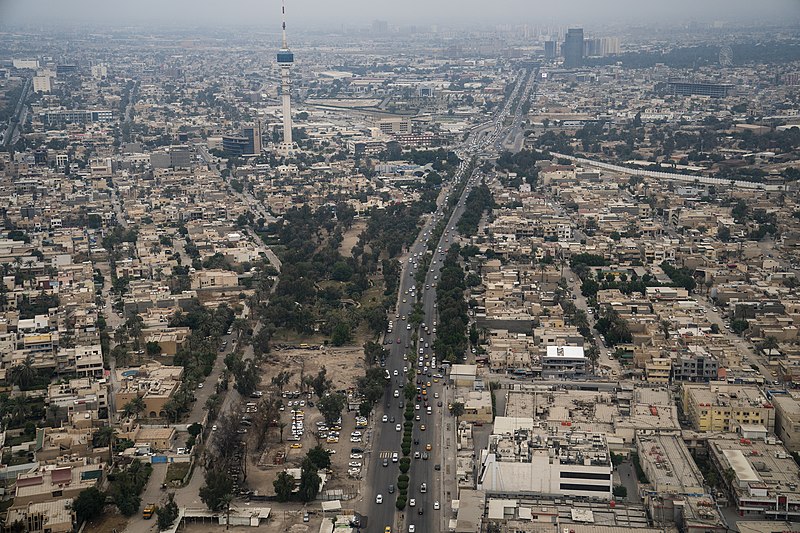The escalated protests by supporters of Iraqi cleric Muqtada al-Sadr led the country’s security forces to implement a nationwide curfew. Following the withdrawal of Sadr’s supporters, security forces walked back their plan to implement the curfew.
Iraq’s security forces Tuesday walked back the plan to implement a nationwide curfew in light of the escalated protests, according to state media. The walk back by the security forces came after Sadr called on his supporters to stop the protests that have escalated into violence. 22 people were killed in the clashes between militias loyal to him and pro-Iran factions.
“This is not a revolution because it has lost its peaceful character,” said Sadr in televised remarks. “The spilling of Iraqi blood is forbidden.”
People were seen leaving the fortified Green Zone by the one-hour deadline Sadr gave.
The clashes between the rival factions of Iraq’s Shi’ite Muslim majority follow 10 months of deadlock that took place after the October elections. While Sadr and his faction gained the most seats in parliament, they were unsuccessful in forming a government that excluded the pro-Iran Shi’ite groups.
The weeks-long protests escalated when Sadr announced that he was quitting politics, citing the failure of other Shi’ite leaders and parties to reform the country’s governing system. Prior to Sadr’s address, an official for the Iraqi government said authorities are unable to impose control over the armed groups.
The official said the country’s military is also just as divided between those who are pro-Iran and those who support Sadr.
State media also reported that following Sadr’s call for his supporters to disperse and stop the protests, Iran reopened its border with Iraq. Tehran closed its borders and stopped flights to Iraq when the demonstrations turned violent.
Millions of Iranians travel to Kerbala in Iraq every year for Arbaeen, the ritual that marks the end of the 40-day mourning period for Imam Hussein, the grandson of the Prophet Mohammad. This year’s Arbaeen will take place on September 16 to 17.
“As security and calm have been restored in Iraq, all borders are open now,” said an Iranian official, according to state television.



 Trump Endorses Japan’s Sanae Takaichi Ahead of Crucial Election Amid Market and China Tensions
Trump Endorses Japan’s Sanae Takaichi Ahead of Crucial Election Amid Market and China Tensions  Trump Backs Nexstar–Tegna Merger Amid Shifting U.S. Media Landscape
Trump Backs Nexstar–Tegna Merger Amid Shifting U.S. Media Landscape  Trump Signs “America First Arms Transfer Strategy” to Prioritize U.S. Weapons Sales
Trump Signs “America First Arms Transfer Strategy” to Prioritize U.S. Weapons Sales  U.S. Lawmakers to Review Unredacted Jeffrey Epstein DOJ Files Starting Monday
U.S. Lawmakers to Review Unredacted Jeffrey Epstein DOJ Files Starting Monday  TrumpRx.gov Highlights GLP-1 Drug Discounts but Offers Limited Savings for Most Americans
TrumpRx.gov Highlights GLP-1 Drug Discounts but Offers Limited Savings for Most Americans  U.S.-India Trade Framework Signals Major Shift in Tariffs, Energy, and Supply Chains
U.S.-India Trade Framework Signals Major Shift in Tariffs, Energy, and Supply Chains  South Korea Assures U.S. on Trade Deal Commitments Amid Tariff Concerns
South Korea Assures U.S. on Trade Deal Commitments Amid Tariff Concerns  TrumpRx Website Launches to Offer Discounted Prescription Drugs for Cash-Paying Americans
TrumpRx Website Launches to Offer Discounted Prescription Drugs for Cash-Paying Americans  Trump Signs Executive Order Threatening 25% Tariffs on Countries Trading With Iran
Trump Signs Executive Order Threatening 25% Tariffs on Countries Trading With Iran  Pentagon Ends Military Education Programs With Harvard University
Pentagon Ends Military Education Programs With Harvard University  Jack Lang Resigns as Head of Arab World Institute Amid Epstein Controversy
Jack Lang Resigns as Head of Arab World Institute Amid Epstein Controversy  China Warns US Arms Sales to Taiwan Could Disrupt Trump’s Planned Visit
China Warns US Arms Sales to Taiwan Could Disrupt Trump’s Planned Visit  Trump Says “Very Good Talks” Underway on Russia-Ukraine War as Peace Efforts Continue
Trump Says “Very Good Talks” Underway on Russia-Ukraine War as Peace Efforts Continue  Trump Lifts 25% Tariff on Indian Goods in Strategic U.S.–India Trade and Energy Deal
Trump Lifts 25% Tariff on Indian Goods in Strategic U.S.–India Trade and Energy Deal  U.S. to Begin Paying UN Dues as Financial Crisis Spurs Push for Reforms
U.S. to Begin Paying UN Dues as Financial Crisis Spurs Push for Reforms  India–U.S. Interim Trade Pact Cuts Auto Tariffs but Leaves Tesla Out
India–U.S. Interim Trade Pact Cuts Auto Tariffs but Leaves Tesla Out  Trump Allows Commercial Fishing in Protected New England Waters
Trump Allows Commercial Fishing in Protected New England Waters 































